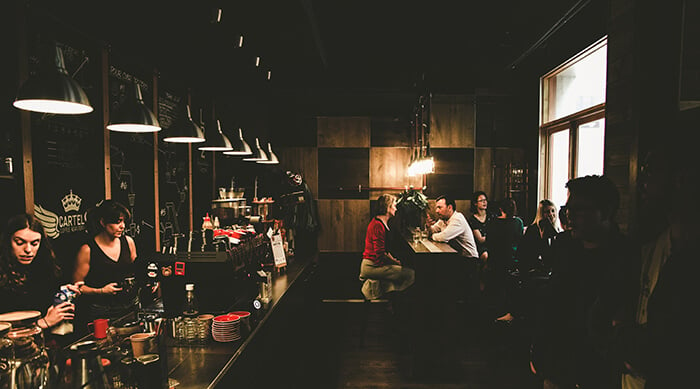At the most basic level, when you’re sober, you’re the opposite of drunk. You haven’t started drinking, have waited enough time since your last drink to sober up, or abstain from drinking.
On a deeper level, living a sober lifestyle can mean you choose not to drink alcohol for the long-term. That can be because of substance abuse issues or you just want to live healthier. Maybe you discovered moderation wasn’t for you after flirting with the sober curious lifestyle.
Table of Contents
Short Term vs. Long Term Sobriety
Moderation Management vs. Abstinence
Defining the Terms
We’ve consulted Merriam-Webster, and the word of the day is sober. It comes from the Middle English word sobre.
Just like today, the olde version meant “in possession of one’s faculties.” Further back than that, the Latin word sobrius meant “without drunkenness.” But the word has come to mean a little bit more.
Sober as in “Not Drunk”
Does sober mean not drunk? Sober does mean “not drunk” in the simplest terms. If you’ve cut out other substances along the way, you may prefer describing your journey as living “clean” rather than just sober. For most, living clean and living sober are synonyms.
Sobering up means you’re in the process of becoming less intoxicated after drinking enough alcohol to get drunk. There really isn’t any way to speed up the process, despite what you may have heard about greasy burgers. Once you stop drinking, the only way to sober up is to wait it out.
Sober Living
What does it mean to be a sober person? Being a sober person means you practice complete abstinence from drugs, alcohol, and other addictive substances. In the short term, it also means you aren’t intoxicated or under the influence of any of those substances.
If you’re in recovery, you’re actively taking the steps to address a drinking problem. Everyone’s path along recovery is different, and what works for some may not work for others.
Emotional Sobriety
Emotional sobriety is a state of mind. Addiction support groups and recovery programs like Alcoholics Anonymous (AA) consider emotional sobriety a key component of maintaining the self-control to keep yourself from drinking alcohol long-term.
That self-control has to be a learned behavior for many drinkers looking to cut alcohol out of their lives. It’s about identifying triggers for alcohol use, like stress, sadness, or boredom, and coming up with coping skills or alternatives to drinking when faced with those triggers.
Emotional sobriety is not about ignoring your feelings, but facing them. That way, you’re less likely to reach for a drink or head to a bar when those feelings get overwhelming. Emotional sobriety has also become a popular self-growth tool outside of just drinking habits for anyone who wants to get more in tune with what makes them tick.
Dry Drunk
Those in recovery who haven’t addressed those root issues are often described as “dry drunk,” a term coined by AA.
Heavy drinkers who quit suddenly may exhibit the following signs of being dry drunk:
- Mood swings
- Anxiety over staying sober
- Compulsive or impulsive behaviors
- Feelings of resentment at those who drink or don’t have the same struggles with alcohol
- Cravings for a replacement addiction
- Negative self-talk
- Sleep problems
Health Benefits of Sobriety
What are the benefits of being sober? The benefits of being sober include improved personal relationships and cost savings. One of the best things about being sober is no more hangovers!
Sobriety also comes with quite a few health benefits, like:
- Reduced risk of a variety of conditions. Heavy drinking increases your risk for cardiovascular problems like heart disease and stroke. You’re also at a higher risk of developing a number of different cancers.
- Improved mental health. Drinking can heighten your emotions in the short-term and destabilize your mood in the long-term. Research shows that there’s a link between excessive alcohol use and depression, too.
- Better sleep. Alcohol may help you fall asleep, but it can also keep you from getting deep sleep. Too much alcohol may keep you from getting to the REM stage of your sleep cycle. That’s the stage important to memory, learning, and preventing brain fog the next day.
- Weight loss. You likely won’t gain a bunch of weight overnight if you’re a light drinker, but heavy drinking over time can make you pack on some pounds, even lead to obesity. Alcohol is considered empty calories. Overeating is more likely after a few drinks, too.
- A stronger immune system. Alcohol affects your body’s immune responses, including your ability to fight off chronic infections. Drinking too much can make it harder to kick both a run-of-the-mill cold or a more serious disease.
- Improved longevity. Drinking less improves cognition and reduces your risk of developing aging-related illnesses. We’ve already talked about the kinds of diseases you’re at risk for if you’re a heavy drinker. Abstaining from alcohol can help you live longer.
- Better sex. It’s fairly common knowledge that alcohol affects erectile function. Turns out, women also have a harder time getting aroused after drinking.
Drinking in moderation does come with some benefits, especially if you’re reaching for resveratrol-rich red wine, but it will always be a better option to drink less or not at all.
First of all, you can get those same antioxidants from chowing down on a handful of red grapes. More importantly, drinking in moderation just doesn’t come naturally for everyone. If you slip into heavy or binge drinking, potential health benefits can quickly become outnumbered by averse affects.
Read Next: The Cycle of Depression and Alcohol Abuse
Short Term vs. Long Term Sobriety
Short-term sobriety is a temporary period of sobriety. Movements like Sober September serve as a reset or cleanse after periods of heavy drinking. It may be a way to kick off long-term sobriety or test out what staying sober might feel like.
It may even be completely casual. Some people treat short-term sobriety as a way to lose weight or as a response to an indulgent vacation.
Long-term sobriety is exactly what it sounds like: a long-term plan for a sober lifestyle. Your reasons for long-term sobriety may go deeper than dropping a few pounds. Maybe you don’t like how you act when you drink to excess, or you’re concerned about health condition associated with heavy drinking.
Figuring out the right path for you depends on your unique situation.
Does sober mean no alcohol? Strictly speaking, yes, sober means no alcohol.
Moderation Management vs. Abstinence
For some, moderation management is more appropriate than cutting out alcohol altogether. That means drinking is limited to moderate, responsible amounts as defined by your personal goals or the more official Moderation Managementguidelines.
These official guidelines come from the non-profit Moderation Management. The group was founded in 1994 as an alternative to AA. It has become a way for people to learn how to stop harmful patterns when they drink and identify triggers for those behaviors.
Drinking in moderation may not be the answer if you struggle with placing limits on your drinking.
For those on Moderation Management plans, that means no more than 4 drinks in one sitting for men and 3 drinks in one sitting for women. According to this plan, men and women shouldn’t drink more than 3-4 days per week.
Please note this is way beyond what the Centers for Disease Control and Prevention (CDC) define as moderate drinking, by the way. The CDC suggests a maximum of 2 drinks per day for men and only one drink per day for women.
The sober truth: Any form of alcohol use in moderation is not appropriate for those with alcohol addiction issues or for recovering addicts. Seeking help from alcohol support groups or an addiction treatment center is your best first step.
What to Expect When You Stop Drinking
If you’re sober curious and treating yourself yourself to a Dry January or Sober October, you may see some immediate benefits once you stop drinking. Your sleep will improve, and you certainly won’t be waking up to any hangovers.
You may find yourself liking this new sobriety thing, as you’ll feel and look better from the inside out.
If you’re a heavy drinker, it’s important that you stop drinking under the care of your doctor or an addiction specialist. It’s likely that you’ll experience some withdrawal symptoms, especially if you’ve developed a dependency on alcohol.
Here’s a sample timeline for what to expect when a heavy drinker stops drinking, with the caveat that everyone’s sober journey may look different:
- 12 hours after: Mild withdrawal symptoms start. This can look like nausea, excessive sweating, and tremors.
- 24 hours after: Withdrawal symptoms get more intense, and may include anxiety and mood swings. Alcohol cravings begin.
- 72 hours after: Withdrawal peaks around the 3-day mark. For most drinkers, symptoms get more manageable after this point.
- One week after: Physical withdrawal symptoms subside for most at 7 days, but emotional withdrawal begins. Alcohol cravings remain.
- 2 weeks after: This is the length of most detox programs. You notice positive changes in mood. Brain fog lifts and you’re able to focus more on sustaining your sobriety long-term.
- One month after: You notice more positive changes in your demeanor, skin, and overall health. You’re sleeping better and may have lost some weight.
After that first month, you start seeing more positive health benefits of sobriety. You feel better overall as your body continues to heal. Your cravings are manageable, especially if you’ve figured out ways to replace alcohol with solid alternatives.
Tips for Success
If you want to get sober and stay sober, there are ways to improve your chances for long-term sobriety.
- Identify your triggers. You may drink when you’re stressed or having trouble with your personal relationships. Maybe you drink when you’re bored or around certain friends in your circle. Figure out what factors contribute to drinking, and ways to work around them.
- Address peer pressure. If you feel pressure to drink in certain social situations or around certain acquaintances, you may need to rethink whether those are good places for you. Good friends will understand what you’re trying to do and support you.
- Embrace socializing without alcohol. You don’t need to drink to have a good time. You don’t even need to drink to have a great time. Throw a sober party. See if you can find a sober bar in your neighborhood that specializes in fancy virgin cocktails.
- Get a hobby. If you were spending a lot of your time drinking and in places where alcohol use is likely, you may need to find new ways to spend your time. Choose ways to reduce stress in your life for a double whammy of wellness.
- Find your zen. Explore ways to center yourself as a way to manage the triggers that make you want to drink. Listen to meditative podcasts. Do some yoga. Take a nature walk and live in the moment.
- Stick to a plan. Come up with a manageable plan for your sobriety that addresses why you drink and what you hope to achieve by drinking less or not at all. Don’t give up, even if you slip up. It’s all a journey, even if you’ve chosen to moderate your drinking.
- Get inspired. Ask a trusted friend or loved one to be your sober buddy on your journey. Look to sober celebritieswho love their sober lifestyle — and look good doing it.
- Keep track. Get a journal to log all of the progress you make along the way. If you find yourself slipping, a journal can also point you to triggers you might not have recognized at first.
- Admit when you need some help. Self-management tips are no replacement for support groups or treatment centers if you’re struggling with alcohol addiction.
If you need help managing alcohol use, contact these support groups:
Your primary care physician or insurance provider can also point you to local addiction treatment facilities or wellness centers that can work with you on your path to a clean and sober life.
Looking for non-alcoholic options?
Keep in mind that alcohol alternatives shouldn’t be used as part of addiction recovery. (You shouldn’t be drinking anything that resembles alcohol if you’re an alcoholic, even if it’s alcohol-free.) They can be a positive addition to a sober curious lifestyle, though.
If you’re sober curious or just looking to cut back on your drinking, you have options. The non-alcoholic beverage industry has been trending hot over the last couple years with alcohol-free alternatives to beer, wines, and spirits that taste just like the real thing.
Surely non-alcoholic wines taste just like the real thing because they start out just like the real thing. The alcohol is just removed at the end, keeping you buzz-free and well on your way to a healthier lifestyle.
Our alcohol-free wines are also a great base for your new favorite mocktails, from white wine spritzers to virgin sangrias. Learn more about the difference a glass of Surely wine can make as part of your sober curious journey.
Sources
- Alcohol consumption and cancer risk
- Alcohol and depression
- Alcohol Consumption and Obesity: An Update
- Innate Immunity and Alcohol
- Effect of alcohol use disorder on cellular aging
- Prevalence of sexual dysfunction in male subjects with alcohol dependence
- Women’s Sexual Arousal: Effects of High Alcohol Dosages and Self-Control Instructions
- Mindfulness meditation for alcohol relapse prevention: a feasibility pilot study




